GO TERM SUMMARY
|
| Name: |
cytoskeletal calyx |
| Acc: |
GO:0033150 |
| Aspect: |
Cellular Component |
| Desc: |
A large cytoskeletal structure located at the posterior end of the perinuclear theca of a mammalian sperm head. The nucleus is tightly associated with the calyx, which contains calicin and basic cylicin proteins. |
|

|
INTERACTIVE GO GRAPH
|














